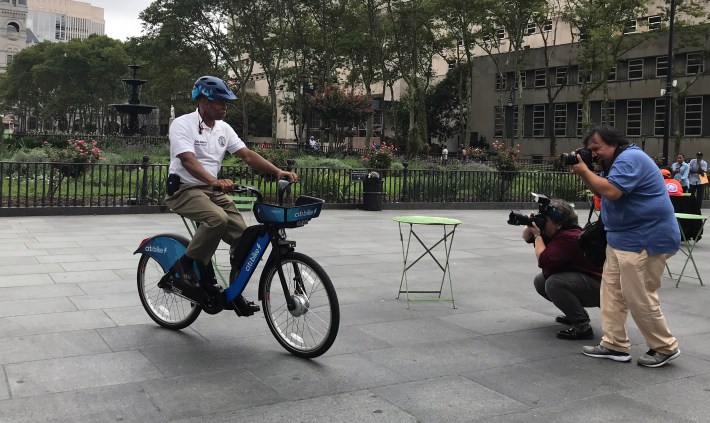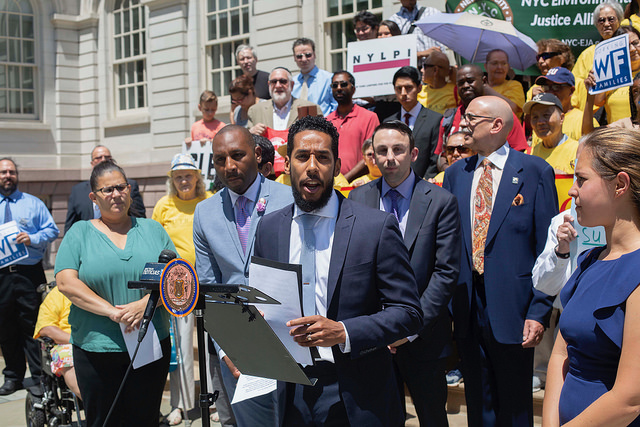—Citi Bike's just-announced $2-per-ride fee on its new fleet of electrified bikes will likely become a "barrier" to the very people who stand to benefit the most from an environmentally friendly, lower cost and, simply, better way of getting around the city than a car, a city council member claims.
Council Member Antonio Reynoso fired off an "open letter" to the Lyft-owned company one day after it revealed that it would expand its e-bike fleet to 4,000, but also charge a $2 fee to use one of the bikes, which have proven extremely popular because of their ease of use and long range. The fee is $.50 per ride for Citi Bike members who live in NYCHA houses or get food stamp benefits.
"We have to ensure that transportation alternatives remain affordable and accessible to all," Reynoso said. "[The] $2 fee for rides on electric bikes undermines this goal. Historically and presently, low-income folks are most affected by inaccessibility to traditional modes of transportation. Additional charges on alternative modes of transportation act as a barrier to these types of transportation and the myriad benefits that they provide to individuals and communities. Furthermore, it undermines our city’s larger efforts to move away from car use."

The $2 fee — waived for Citi Bike members until April 27 — has come under fire from many quarters since it was announced this week, with some foes likening it to a fare hike on what should be a form of public transportation, yet is ostensibly a public-private partnership even though the city allocates no public money. Others reminded that Citi Bike has a monopoly on service, with dockless rivals Jump and Lime only allowed to operate in small pilot zones in the Bronx and Staten Island.
And disgruntled non-members pointed out that residents of neighborhoods not currently served by Citi Bike — such as Jackson Heights, Crown Heights, the Bronx and northern Manhattan — would benefit the most from the longer-range e-bikes, yet don't have any opportunity to get them.
Citi Bike officials have defended the fee, in part because the company does not yet know how much it will cost to swap out batteries and maintain such a vast fleet — which will, by the end of the spring, comprise roughly one-third of Citi Bike's overall 13,000 bikes. And a 30-minute ride on an electric Citi Bike would still be 50 cents cheaper than the same ride on an electric Jump Bike, which cost 15 cents per minute.
In a statement, the company said it shares Reynoso's larger goals of fewer car trips and an equitable system for all.
“We appreciate Council Member Reynoso’s feedback and the priority he places on transportation equity and access," company spokeswoman Julie Wood said in a statement. "Those are values we share and we look forward to engaging in a dialogue about the right way to balance our increased costs for electric bikes with providing great service to all New Yorkers.”
Wood said earlier in the week that Citi Bike would poll its annual members to determine if they would prefer per-ride charges or an additional annual fee above the current $169 if it included unlimited e-bike rides. The company could also charge slightly more, but cap the number of e-bike rides at a set number per month. But the Lyft-owned company may simply not yet know how much it will cost to maintain the newly expanded fleet.
Whether one accepts the $2 fee or not, one thing is clear: By adding 4,000 electric bikes into its fleet, Citi Bike is making a strong statement of its vital place in the city's larger public transportation network — as important an option as, say, Mayor de Blasio's ferry system, which is subsidized at $6.60 per ride and has far lower user than Citi Bike. Unlike every other form of public transit, Citi Bike gets no public money.
City officials have defended their lack of public investment in the past by arguing that the mayor sealed a deal for Citi Bike to expand its overall fleet to 40,000 bikes in five years at no cost to taxpayers. And, a source told Streetsblog, Lyft did not even ask for a subsidy for the e-bike expansion.
[After initial publication of this story, City Hall spokesman Seth Stein said, “We appreciate their concerns. With Citibike keeping a reduced fare for NYCHA and food stamps recipients, and dramatically expanding the availability of peddle-assist bikes, this will make biking even more accessible to New Yorkers — at no cost to taxpayers.]
Reynoso raised such issues in his open letter.
"There is no denying that transportation options in New York City are currently insufficient and unsatisfactory," he wrote. "In order to address our unique and pressing transportation issues, we must embrace and increase the use of alternative modes of transportation. Shared bike and electric bike networks are key in this effort."
Specifically, though, Reynoso demanded to know how the $2 fee was determined and how many riders Citi Bike believes it will affect.
"While I understand the financial constraints that companies such as Lyft face, New Yorkers deserve transparency about why they are being charged more for a service as essential as transportation," he wrote. "Information regarding what the shortfall would be is especially pertinent, as I would like to raise the possibility that New York City consider funding this shortfall. By subsidizing programs such as Citi Bike, New York City would reaffirm its commitment to long term-sustainably, equity, and quality of life for all New Yorkers."
City Hall declined to comment for this story.
Council Member Antonio Reynoso's letter is embedded below.






